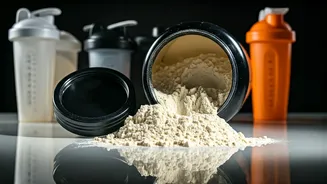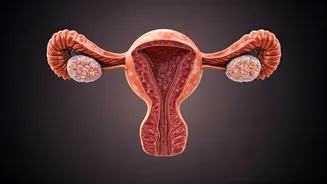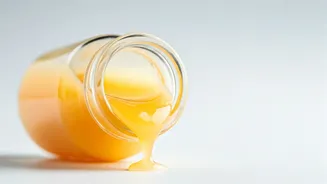Nutrition's Role
Your diet is a foundational element in nurturing hair growth. Eating a well-balanced diet rich in vital nutrients is crucial. Focus on protein, which forms
the building blocks of hair. Include foods like eggs, lean meats, and beans in your meals. Biotin, often called vitamin B7, is another key nutrient linked to hair health; add foods rich in biotin, such as sweet potatoes, nuts, and seeds. Iron deficiency can often result in hair loss, so ensure you're consuming enough iron through foods like spinach and lentils, or consider supplementation. Remember to stay hydrated since water is vital for overall health, including your hair's health. A balanced diet provides the necessary components to support healthy hair growth from the inside out. Prioritize nutrient-rich foods consistently for visible improvements in your hair's condition and growth rate.
Scalp Massage Boost
Regular scalp massages can do wonders for stimulating hair growth by enhancing blood circulation to the hair follicles. Use your fingertips to gently massage your scalp in circular motions for a few minutes each day. This technique helps increase blood flow, which delivers essential nutrients and oxygen to the hair follicles. Consider using natural oils like rosemary or coconut oil during the massage; these oils have been shown to boost hair growth. Consistent scalp massages not only stimulate hair growth but also help to relax your scalp muscles, reducing stress and promoting overall hair health. Incorporate scalp massages into your daily or weekly routine to take advantage of their benefits and witness enhanced hair thickness and length over time. Remember to apply light pressure and focus on stimulating the scalp in all directions.
Gentle Hair Care
The way you handle your hair can significantly affect its health and growth. Start by using a gentle shampoo and conditioner that are free from harsh chemicals like sulfates and parabens. These chemicals can strip your hair of its natural oils, leaving it dry and prone to breakage. When washing your hair, avoid hot water; use lukewarm water instead to prevent damage. After washing, pat your hair dry with a soft towel instead of vigorously rubbing it. Be cautious while styling your hair to avoid excessive heat from styling tools. If you use a hairdryer, opt for a low heat setting. Use a wide-tooth comb to detangle your hair gently, and avoid pulling or tugging. Choose soft, smooth hair ties to prevent breakage. By being gentle with your hair, you minimize damage and promote the optimal environment for hair growth.
Oil Treatments Benefits
Incorporating oil treatments into your hair care routine can provide intense nourishment and hydration, contributing to improved hair growth. Many natural oils are beneficial; choose oils such as argan, coconut, or jojoba oil, which are rich in nutrients and fatty acids. Apply the oil to your hair and scalp, focusing on the roots and ends. Gently massage the oil into your scalp to boost circulation. Leave the oil on for at least 30 minutes, or even overnight for deeper conditioning. Wrap your hair in a warm towel to enhance the oil's penetration. Once the oil has had time to work, rinse your hair thoroughly with shampoo and conditioner. Regular oil treatments will nourish your hair, reduce breakage, and create a healthier scalp environment, leading to faster hair growth.
Supplements Wisdom
Supplements can play a role in supporting hair growth, especially if your diet lacks specific nutrients. Consider supplements like biotin, which is known for its role in hair, skin, and nail health. Consult with a healthcare professional before starting any new supplements, to make sure they are appropriate for you. Other supplements such as collagen, zinc, and iron can also be beneficial, so evaluate your diet and any deficiencies. Remember, supplements work best when coupled with a healthy diet and lifestyle. It’s also important to follow dosage instructions carefully and avoid taking excessive amounts of any supplement. Supplements are not a quick fix, but they can assist in achieving your hair growth objectives when utilized correctly.
Reduce Stress Levels
Stress can negatively influence hair health and slow down growth. Find healthy ways to manage stress, like meditation, yoga, or spending time in nature. Practicing mindfulness techniques can significantly reduce stress levels. Engage in relaxing activities, like reading, listening to music, or taking warm baths. Adequate sleep is also crucial for overall health, including hair growth; aim for seven to eight hours of sleep each night. Reducing stress optimizes your internal environment and ensures that your body can allocate its resources to hair growth. By prioritising your mental well-being, you can foster a healthier scalp and encourage improved hair growth.
Trim Regularly
Even though it might seem counterintuitive, regular trims are essential for promoting hair growth. Trimming your hair every few months helps to remove split ends and prevents them from traveling up the hair shaft, which can cause further breakage. By getting rid of split ends, you help keep your hair healthy and strong, which allows it to grow longer. The amount of hair you need to trim varies depending on your hair’s condition and growth rate, but a trim every 2-3 months is a good general guideline. This might seem counterproductive if your goal is to grow your hair, but this process is essential to stop breakage and make your hair look more healthy. Consistent trims are a great investment in your overall hair health.
Sleep On Silk
Switching to a silk pillowcase can enhance your hair's health and support growth. Silk's smooth surface reduces friction between your hair and the pillowcase, minimizing breakage and tangling. Cotton pillowcases can create friction, leading to hair loss and damage while you sleep. Silk retains moisture, so your hair stays hydrated overnight, reducing dryness and frizz. Using a silk pillowcase can be particularly beneficial if you have curly or textured hair, which tends to be more prone to breakage. Silk pillowcases are gentle on your hair, and can aid in preserving your hair's natural oils, promoting a healthier scalp and encouraging hair growth. Making this simple switch can make a noticeable difference to your hair's overall quality and growth.













